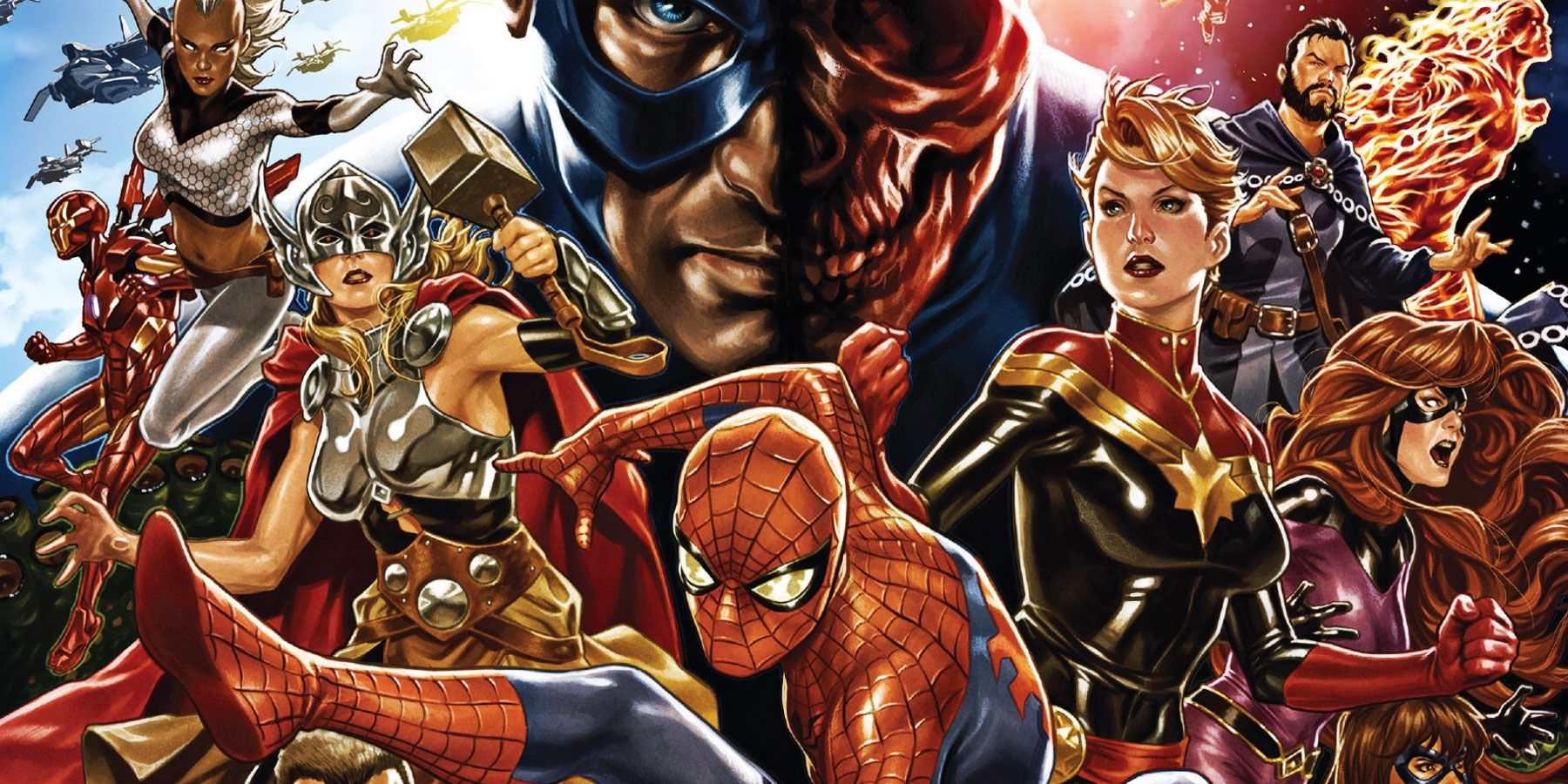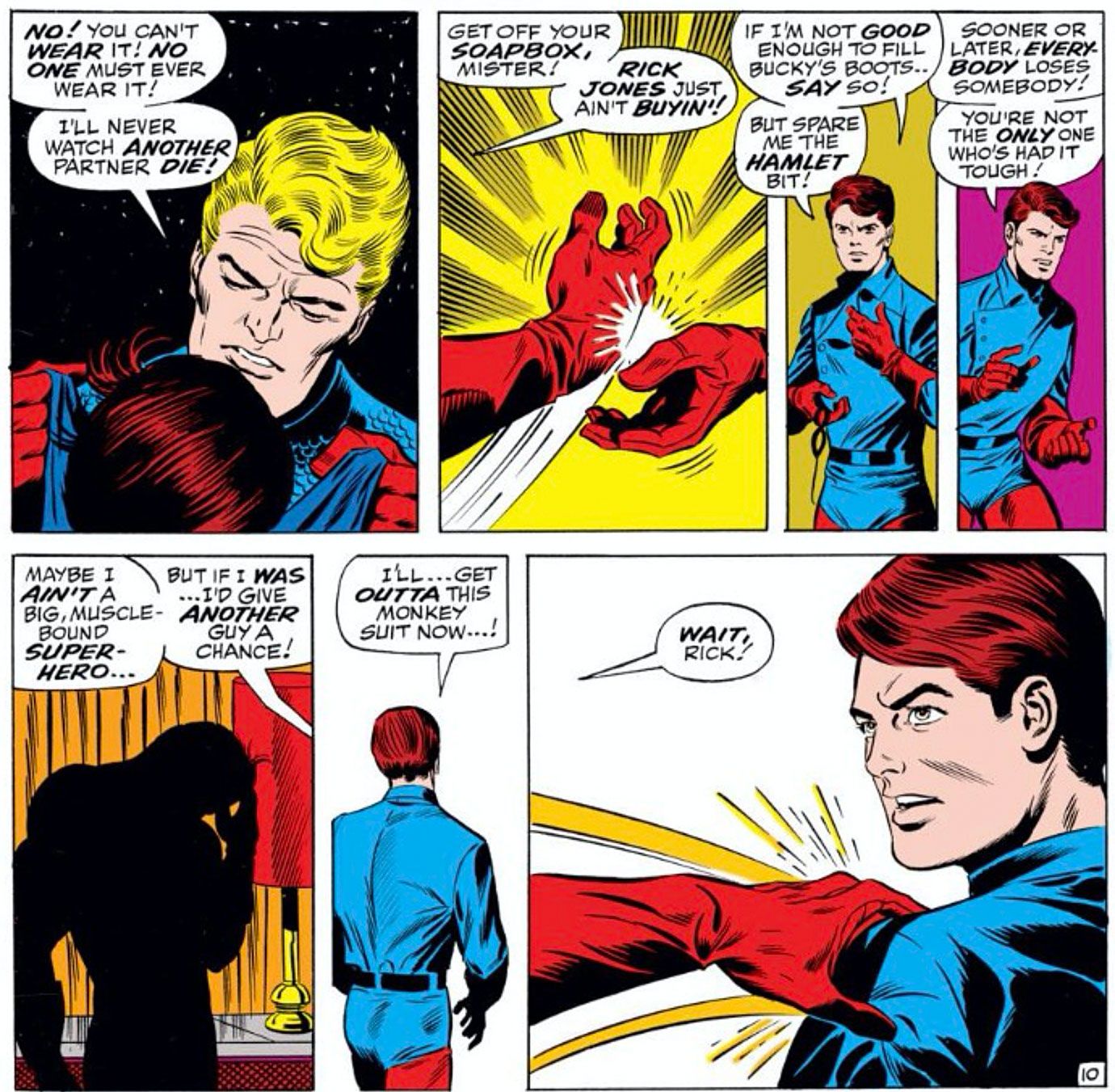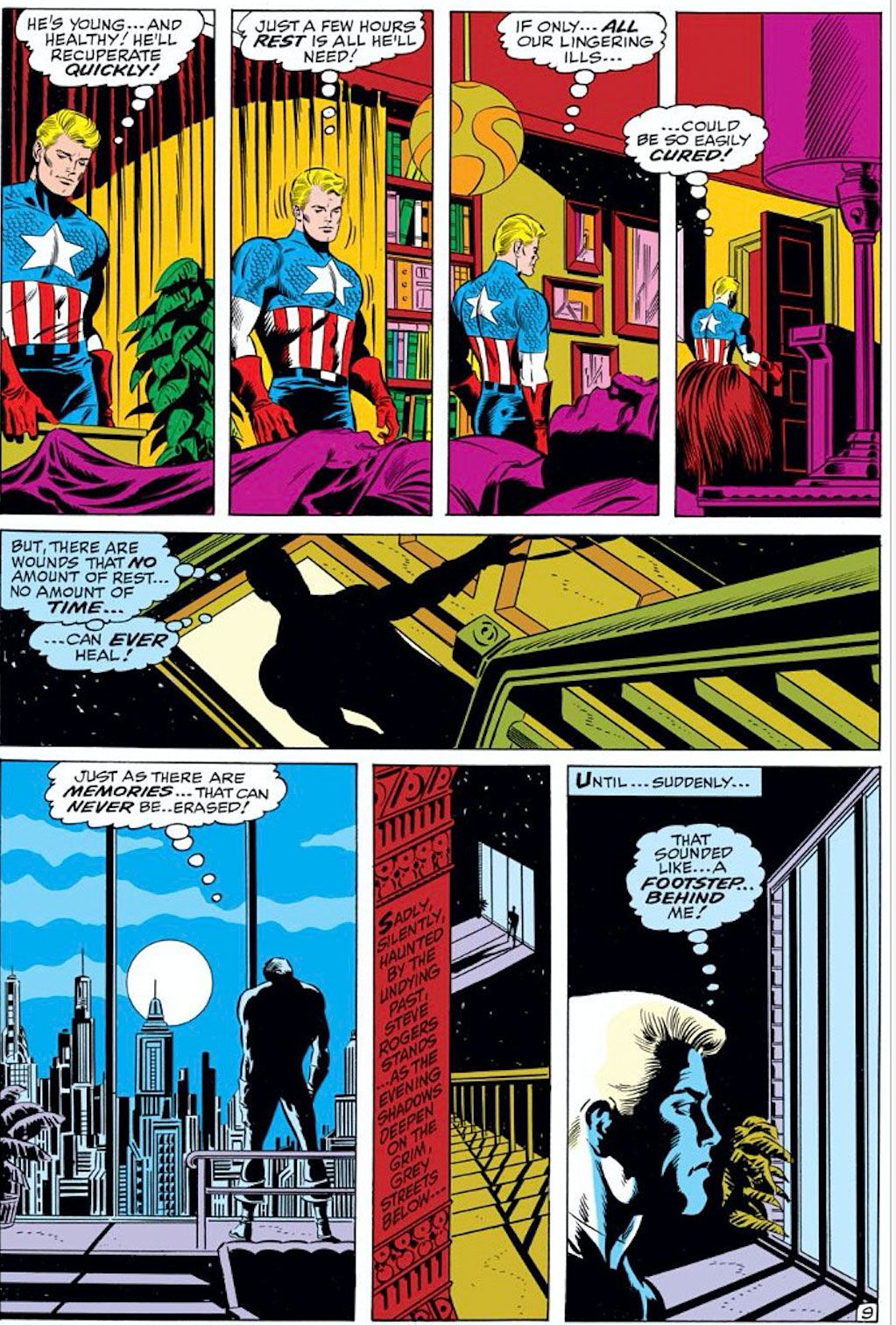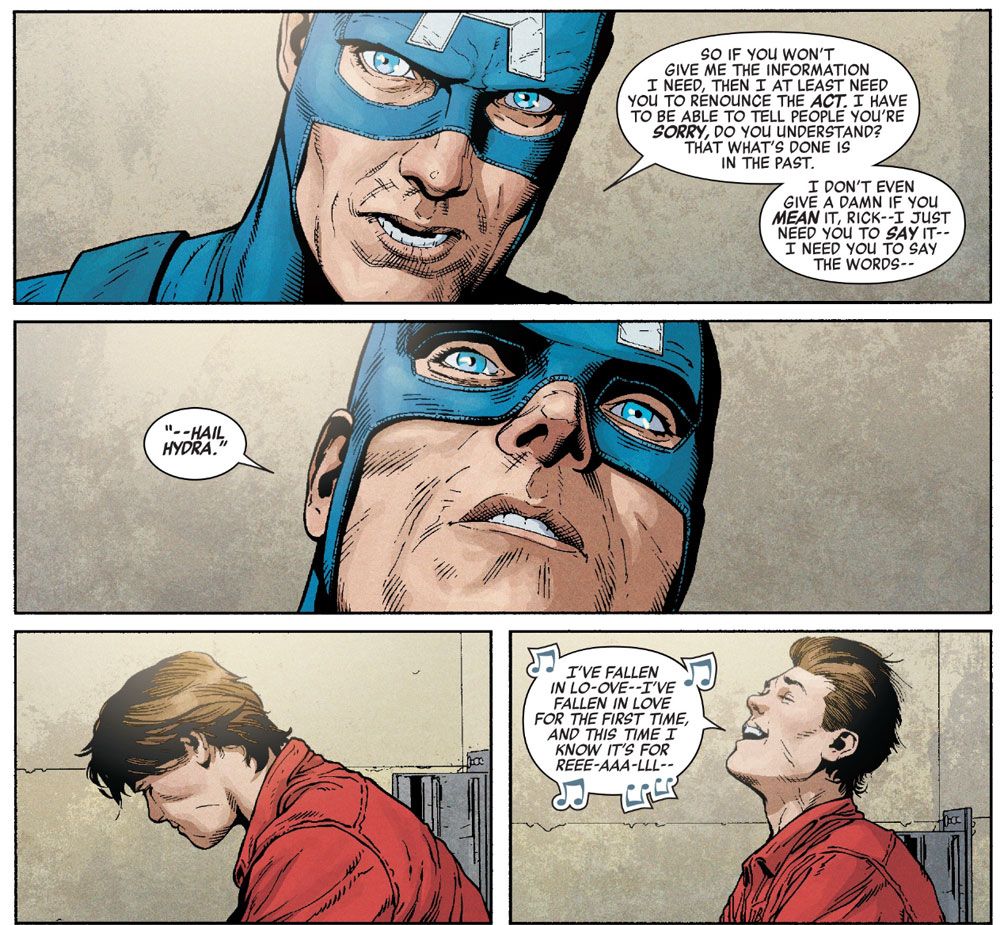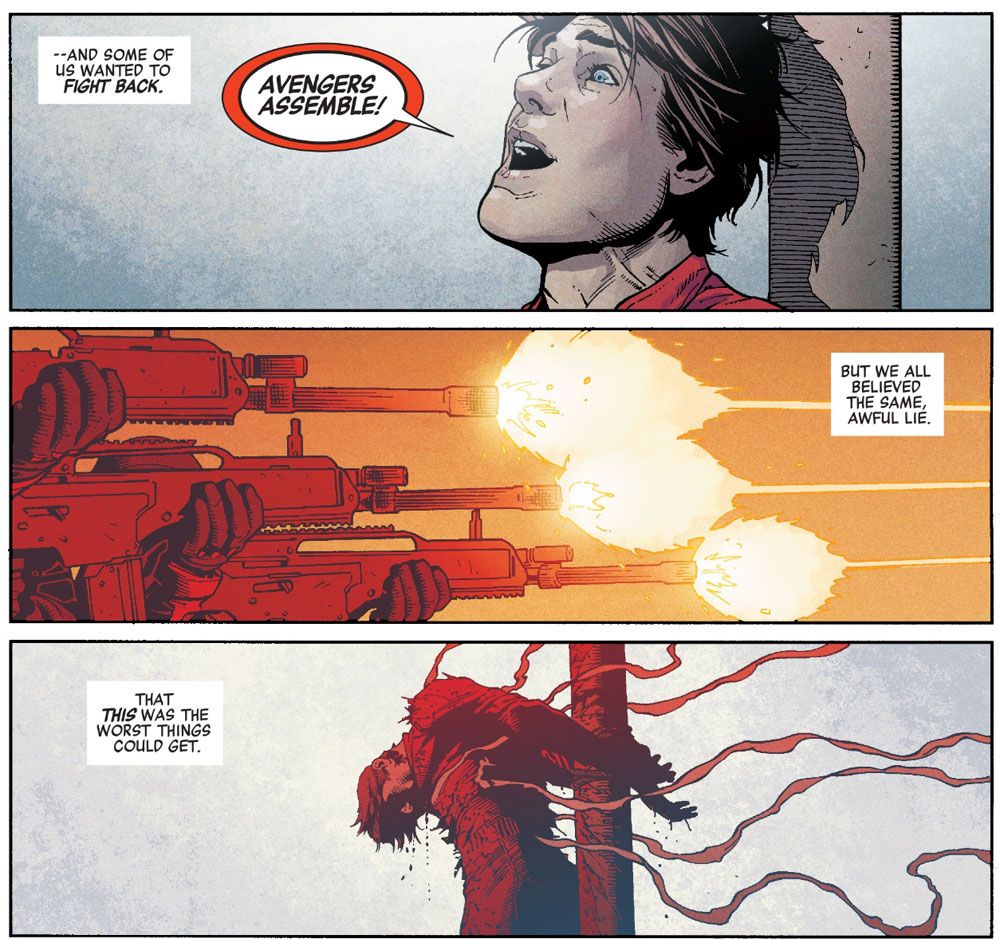SPOILER WARNING: The following article contains major spoilers from “Secret Empire” #1, by Nick Spencer, Steve McNiven and Mark Brooks, in stores now.
Rick Jones has been slowly and steadily being positioned at the very heart of the “Secret Empire” build up and boil over from the very start of the whole Kobik debacle, as far back as the “Avengers: Standoff” event where he was responsible for leaking Maria Hill’s Pleasant Hill prison to the rest of the superheroic community. So it probably isn’t a huge surprise that he plays a major role in “Secret Empire” #1.
...It just may not be the major role anyone was expecting, as Rick Jones finishes the issue as the victim of an execution.
Rick’s brutal demise signals the definitive beginning for what has become the darkest era in Steve Rogers’ history, and to understand why, we’ll need to go back to the beginning.
Reeeee-wind
To say Rick Jones’ history is a complicated one, even by comic book standards, is putting it pretty mildly. He’s been a sidekick, a confidant, a team leader, a Hulk, an omnipotent being, and a reformed whistle blower, all in the span of 55 years.
Oh, and once upon a time, as one of his revolving door sidekick gigs, he was Bucky.
Captain America has an interesting relationship with legacy mantles. In fact, historically, one of the most commonly recurring themes in Captain America comics were villains who were attempting to emulate Steve Rogers only to find themselves mentally and physically broken by the experience. This reoccurring narrative peppered Marvel’s canon with a handful of “extra” Captains Americas along with a few “Buckies” to round out the set. Some were good, or redeemable, and some were totally villainous. Most stepped into the role totally independent of (or sometimes specifically in spite of) Steve Rogers and James Buchanan Barnes.
And then, there was Rick.
It was 1969, just six years after Rick’s introduction as the companion-slash-sidekick of Bruce Banner (and just four years after Steve’s Silver Age reintroduction,) when things went a bit predictably awry for him. As it turns out, being a teenager who's pretty frequently in the path of the Hulk isn’t the safest thing in the world. During one of his all-too-frequent near misses with Hulk, Rick found himself rescued by none other than Steve Rogers.
This is where the plot takes a strange turn. Immediately after the rescue (and some subliminal advice from Steve to “never return to the Hulk”), Rick takes it upon himself to retrieve Bucky’s old costume from Steve’s apartment and present himself rather unceremoniously to Steve as a new sidekick candidate. It’s the sort of fast-paced, nearly exposition-free storytelling endemic of that era, but more importantly, it gives a real chance to really highlight some deeply interpersonal conflicts bubbling under the surface of the recently resurrected Cap.
Steve’s inner monologue opens a window to his own post-return loneliness and guilt over the death of the original Bucky Barnes -- an event which, for the world, happened well over a decade ago, but for Steve, had only been a handful of years.
“[...] there are wounds that no amount of rest...no amount of time can ever heal!” Cap thinks, as he ruminates on the similarities between Rick and Bucky, just moments before Rick bursts into the room -- recovered and wearing Bucky’s old uniform. Cap’s immediate reaction is, predictably, pretty negative, but Rick doesn’t allow for much in the way of objection. “Spare me the Hamlet bit,” he demands. “Sooner or later, everybody loses somebody! You’re not the only one who’s had it tough!”
In terms of meta and narrative commentary, it’s pretty heavy-handed, but it’s not a position Steve can argue against. The two of them begin training together immediately, though not for very long. One issue into his new gig, Rick finds himself kidnapped by Hydra and dragged into a plot that leads to Steve faking his own death. Things deteriorate out from there pretty rapidly. All told, Rick’s tenure as Bucky lasts about six issues.
Unceremonious and brief as it may have been, that handful of issues left Rick and Steve linked in an unexpected way. Rick represented one of the few truly positive moments in Cap’s earliest years -- an era that was largely defined by recurring themes of isolation, displacement and overall anxiety. He was also the first person Steve officially allowed to step into Bucky’s role after his death, a form of consent he normally wouldn’t be asked to give.
Rick would eventually go on to become the sidekick of Captain Mar-Vell, and then eventually become a Hulk named A-Bomb, but his training and combat ability would always circle back to the instruction he was given from Steve. Conversely, his mentorship of Rick finally absolved Steve of some of the guilt he carried about Bucky’s death, which opened some new developmental doors in terms of his evolution as a character moving forward -- a catharsis that would pave the way for his eventual partnership with heroes like Sam Wilson.
In short, Rick Jones and Steve Rogers mattered to one another at genuinely formative points in their respective stories.
Fast Forward
Rick’s slow march towards the very center of “Secret Empire” was done with relative subtlety. After losing his A-Bomb powers, he was temporarily granted an ability similar to Taskmaster, where he can learn new skills at lightning speed. With this ability, he became a hacktivist known as Whisperer, who began to funnel information to both Steve Rogers and Sam Wilson, thus helping to uncover the Kobik project and Pleasant Hill.
Steve then allowed Rick to unofficially step back into his sidekick role and act as a S.H.I.E.L.D hacker and liaison in lieu of facing any criminal charges for his hacktivism. This, unfortunately, just so happened to place Rick right at the heart of things during Steve’s grand Hydra gambit and reveal during “Secret Empire’s” opening salvo in Issue #0. It was during this time Rick is knocked out and thrown in jail by Hydra agents, as Steve watches his plans unfold.
Now, with the dust of the takeover settling, we’re left with an imprisoned Rick who has been given a front row seat to Hydra’s ultimate corruption by of one of his earliest, most influential mentors.
Steve offers him a way out -- all Rick has to do is say “Hail Hydra” and he’ll be free to go. Rick refuses, insisting he knows Steve will find a way out of this situation, returning to his Captain America core values, because he always does. To salt the wound just a bit more, Rick tells Steve that he’s his hero. Back on the helicarrier, Sharon Carter is quick to note Rick’s importance to Steve and begs him to spare his life.
Her pleas, it would seem, fall on deaf ears, as Steve has Rick executed by firing squad. The former sidekick's last words, in a staggeringly bleak turn, are “Avengers Assemble!”
In terms of sealing the deal on Steve Rogers’ villainous revelation, this moment is more than just a nail in the proverbial coffin -- it’s dropping the coffin into a vat of quick drying cement. The emotional and historical importance of Rick Jones to Steve Rogers might be a bit of a deep dive for some, but the literal death by firing squad of a self-identified fan and believer in Captain America’s heroic values punches through any need for prerequisite knowledge of their shared past.
The Steve Rogers that we knew and loved -- that Rick Jones knew and loved -- has definitively left the building.

